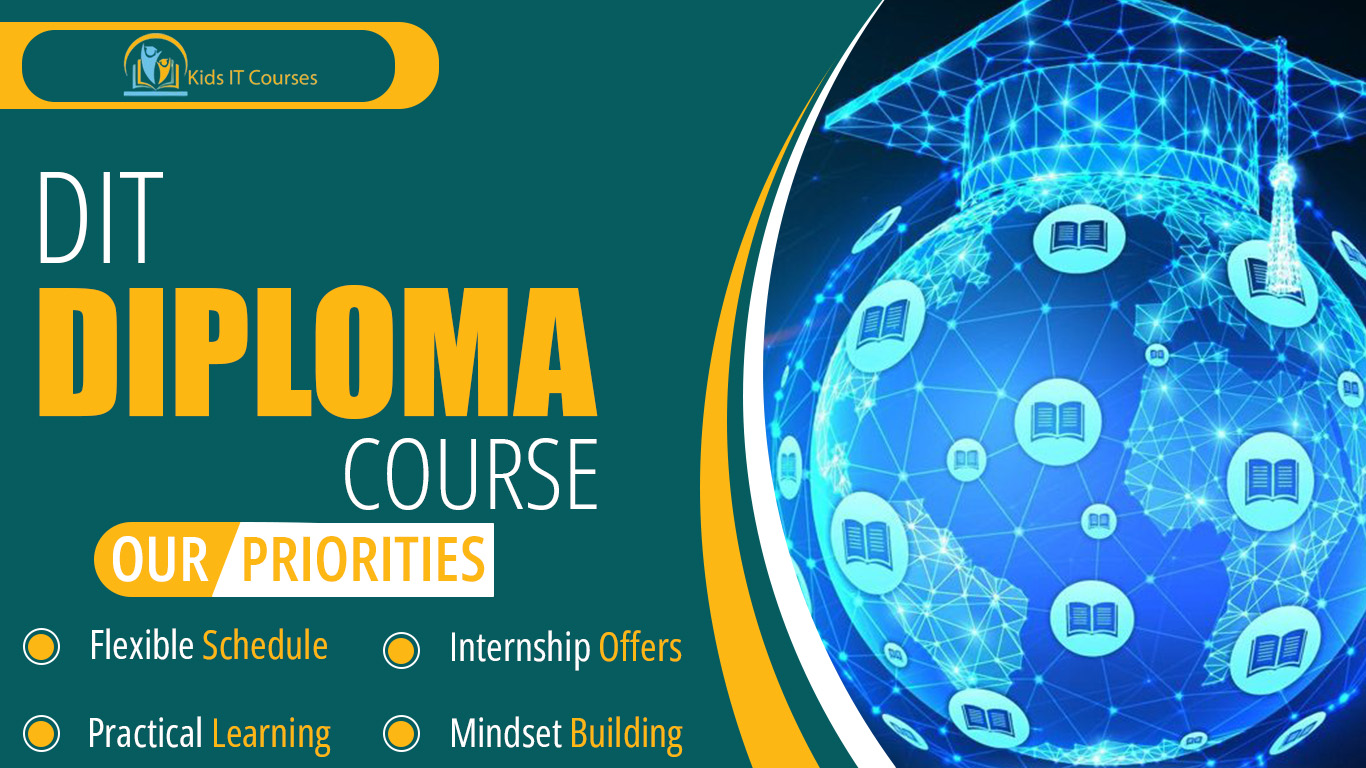
DIT Diploma Course for Kids
Definition
•Kids learn how to use a computer smartly and safely. They get comfortable with everyday tech tools.
• They practice using Word, Excel, PowerPoint, and typing fast. These are important skills for school and future jobs.
• Kids learn how to browse safely and send emails. They understand how the online world works.
• They are introduced to simple coding tools and logic. This builds early interest in tech and problem-solving.
• Kids create posters, websites, and digital art. It boosts creativity and design thinking.
• They do small projects and fun tasks on the computer. This helps them learn by doing, not just reading.
• DIT gives kids a taste of many tech topics. It helps them choose what they love and want to learn more about.
DIT Diploma | Kids Online Short Courses Nearby Rawalpindi
Importance
• Kids learn the basics of how computers work. It builds a strong foundation for all tech learning.
•They explore tools like MS Word, Excel, and PowerPoint. These are helpful for schoolwork and daily life.
• DIT includes web design, programming, graphics, and MS Office. Kids get to explore many tech areas in one course!
• Kids don’t just learn — they do! They build websites, design slides, and even write basic code.
• They use IT skills for homework, research, and presentations. It makes learning at school more fun and creative.
• DIT is the first step for kids interested in computers and tech jobs. It opens the door to fields like coding, design, and engineering.
• As kids learn and complete fun projects, they feel proud. It boosts their confidence and love for learning.
Advantages for Freelancing
• Kids learn how to use computers, software, and digital tools. It builds a strong foundation in technology.
•They explore areas like typing, coding, MS Office, and internet safety. It’s a complete course for digital learning.
• The course teaches how to solve problems using computers. It helps kids become smart and creative thinkers.
• Kids learn to work on projects, type faster, and use software. They feel more confident using computers in school and at home.
• They learn how to stay safe online and avoid risky websites. This builds good digital habits.
• The course includes games, tasks, and hands-on projects. Kids enjoy learning while doing exciting activities.
• Technology is part of every job today. DIT gives kids a great head start in the tech world.
Session 1 : Introduction to Information Technology
- What is IT and why it’s essential in today’s world
- Real-life example: How your computer helps with school, work, and fun
- History and evolution of IT
- Basic understanding of hardware and software
- Activity: Identify parts of a computer system and their functions
Session 2 : Operating Systems
- What is an operating system? (Windows, Linux, macOS)
- Real-life example: Navigating through your phone or computer interface
- How an OS helps you run applications and manage files
- Hands-on: Install and use a basic operating system
- Activity: Customize your desktop and install a software program
Session 3 : Computer Hardware and Peripherals
- Understanding the basic components of a computer
- Real-life example: How your printer or mouse connects to your computer
- The role of CPU, RAM, hard drives, and other parts
- Hands-on: Open a computer and identify the hardware components
- Activity: Create a list of the most common peripherals and their uses
Session 4 : Software and Applications
- Understanding different types of software: System vs. Application
- Real-life example: Using Google Chrome vs. Windows File Explorer
- How software helps us work more efficiently
- Installing and uninstalling applications
- Activity: Install a new software program and review its features
Session 5 : Networking Basics
- What is networking and how do devices connect?
- Real-life example: How Wi-Fi allows you to connect your phone to the internet
- Introduction to routers, modems, and IP addresses
- Understanding LAN and WAN
- Activity: Set up a small home network with a router
Session 6 : Troubleshooting and Support
- Common IT issues and how to solve them
- Real-life example: Solving problems like slow internet or a frozen computer
- How to use built-in troubleshooting tools
- Understanding error messages and logs
- Activity: Troubleshoot a simple computer issue
Session 7 : IT Security Essentials
- Why IT security is important in today’s digital age
- Real-life example: Protecting your social media accounts with passwords
- Introduction to firewalls, antivirus software, and encryption
- Best practices for securing your data
- Activity: Set up a firewall on your computer and scan for viruses
Session 8 : Career Paths in IT
- Exploring different IT careers: Network Engineer, IT Technician, Support Specialist
- Real-life example: How IT professionals keep businesses running smoothly
- Skills required for various IT roles
- Activity: Research an IT career path and create a career roadmap
Bonus Materials
- IT troubleshooting checklist
- Free online resources for continued learning
- IT industry glossary
- Certificate of Completion for DIT Diploma Course
